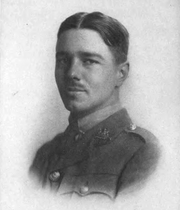
Wilfred Owen
"Anthem for Doomed Youth" is a well-known sonnet by English poet Wilfred Owen on the horror of war.
Anthem for Doomed Youth[]

Dead Soldiers, by László Mednyánszky (1852–1919). Courtesy Wikimedia Commons.

Anthem for Doomed Youth
What passing-bells for these who die as cattle?
Only the monstrous anger of the guns.
Only the stuttering rifles' rapid rattle
Can patter out their hasty orisons.
No mockeries now for them; no prayers nor bells,
Nor any voice of mourning save the choirs,—
The shrill, demented choirs of wailing shells;
And bugles calling for them from sad shires.
What candles may be held to speed them all?
Not in the hands of boys, but in their eyes
Shall shine the holy glimmers of good-byes.
The pallor of girls' brows shall be their pall;
Their flowers the tenderness of patient minds,
And each slow dusk a drawing-down of blinds.
This poem is in the public domain
History[]

Manuscript by Owen, with revieions by Sasoon. Courtesy Wikimedia Commons.
While at hospital, Owen met and befriended Siegfried Sassoon, and asked for his assistance in refining his poem's rough drafts. It was Sassoon who named the start of the poem "anthem", and who also substituted "doomed" for "dead"; the famous epithet of "patient minds" is also a correction of his. The amended manuscript copy, in both men's handwriting, still exists and may be found at the Wilfred Owen Manuscript Archive on the world wide web.[1]
Form[]
The poem employs the traditional form of a Petrarchan sonnet, but it uses the rhyme scheme of a Shakespearean sonnet.
Analysis[]
Much of the second half of the poem is dedicated to funeral rituals suffered by those families deeply affected by World War I. The poem does this by following the sorrow of common soldiers in one of the bloodiest battles of the 20th century. Written between September and October 1917, when Owen was a patient at Craiglockhart War Hospital in Edinburgh recovering from shell shock, the poem is a lament for young soldiers whose lives were unnecessarily lost in the First World War. The poem is also a comment on Owen's rejection of his religion in 1915.[2]
See also[]
References[]
- ↑ "The First World War Poetry Digital Archive". University of Oxford. http://www.oucs.ox.ac.uk/ww1lit/. Retrieved 2009-02-21.
- ↑ http://www.1914-18.co.uk/owen/anthem.htm
External links[]
- Text
- Anthem for Doomed Youth" at Representative Poetry Online
- Anthem for Doomed Youth at the Poetry Foundation
- Poem with notes at the War Poetry Website
- Audio / video
- About
- Anthem for Doomed Youth at the Wilfred Owen Association
- Anthem for Doomed Youth at Shmoop
| This page uses Creative Commons Licensed content from Wikipedia. (view article). (view authors). |
Template:Wilfred Owen